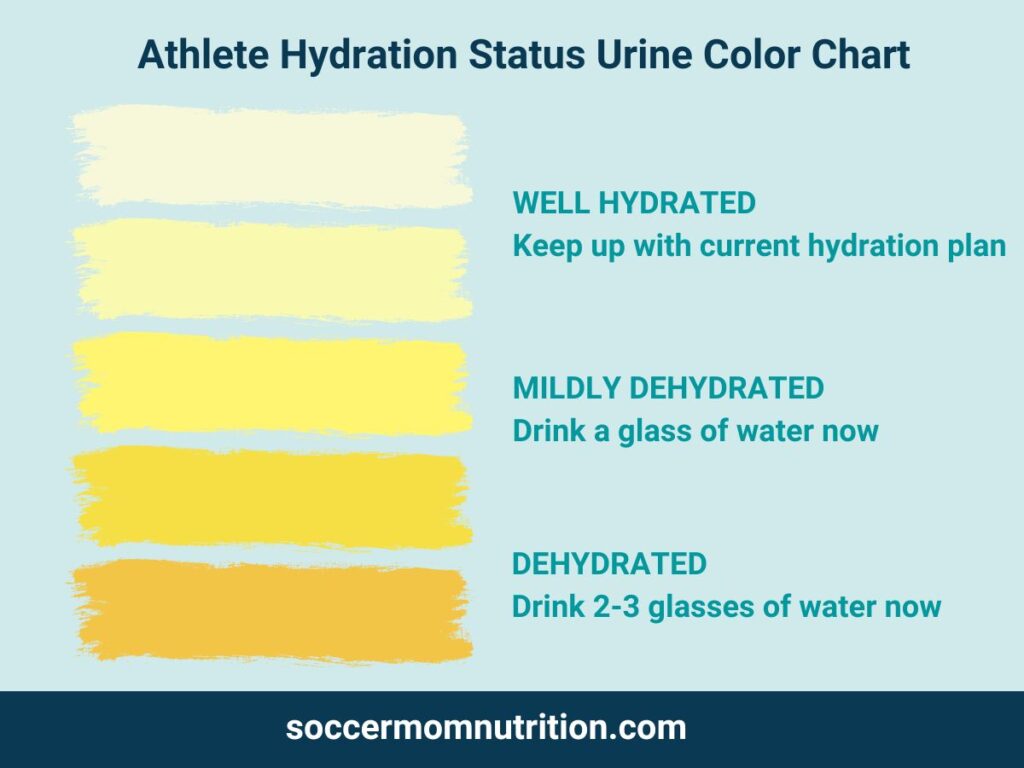10 Signs of Dehydration: How Athletes Can Prevent It
Dehydration happens when your body loses more water than it takes in. Recognizing the 10 signs of dehydration is important since dehydration can affect your health and performance in many ways.
Dehydration causes headaches, fatigue, confusion, muscle cramps and even fainting. It can also increase your risk of injury, kidney stones and heatstroke.
Dehydration is especially common and dangerous for teen and youth athletes, who may sweat a lot during physical activity and forget to drink enough fluids. Dehydration can impair your athletic performance, concentration and recovery. (1)
Read on to learn about the 10 signs of dehydration and tips to incorporate into your sports nutrition performance plan.

10 Signs of Dehydration
To avoid dehydration, you need to recognize the warning signs and symptoms and take steps to replenish your fluids.
1. Thirst
Thirst is one of the most obvious signs of dehydration, but it is not always reliable. Sometimes you may not feel thirsty until you are already dehydrated and have lost 1-2% of body weight.
2. Dark urine
The color of your urine can tell you a lot about your hydration status. Normally, urine should be clear or pale yellow. If your urine is dark yellow or amber, it means you are not drinking enough water and your body is trying to conserve it.

3. Dry mouth and lips
Another sign of dehydration is dry mouth and lips. When you are dehydrated, your saliva production decreases and your mouth feels dry and sticky. Your lips may also crack and peel.
4. Headache
Dehydration can cause headaches by causing low blood pressure and reduced blood flow and oxygen to your brain. It can also trigger migraines or make them worse.
Dehydration headaches can range from mild to severe and may be accompanied by dizziness, nausea or sensitivity to light and sound.
5. Fatigue
Dehydration can make you feel tired and sluggish by affecting your metabolism and energy levels. When you are dehydrated, your body has to work harder to maintain its normal functions and core body temperature.
This can drain your physical and mental energy and make you feel weak and sleepy.
6. Muscle cramps
Dehydration can cause muscle cramps by reducing the blood flow and electrolytes to your muscles. Electrolytes are minerals like sodium, potassium, calcium, and magnesium that help regulate muscle contractions and nerve impulses.
When you sweat, you lose electrolytes along with water. If you don’t replace them, your muscles may cramp up or spasm.
7. Confusion
Dehydration can affect your brain function and cause confusion, disorientation, or difficulty concentrating. It can also impair your memory, judgment, and coordination. Dehydration can alter your mood and make you irritable, anxious or depressed.
8. Dizziness or fainting
Dehydration can cause dizziness or fainting by lowering your blood pressure and reducing the blood flow to your brain. When you stand up quickly, you may feel lightheaded or dizzy.
If you don’t drink enough water, you may lose consciousness or faint.
9. High core body temperature
When you’re dehydrated, your body is less able to cool itself down because you’re not able to sweat to cool off your body. Additionally, your blood volume decreases and it’s harder for your body to circulate blood to be cooled.
10. Rapid heartbeat or breathing
Dehydration can affect your heart and lungs and cause rapid heartbeat or breathing. When you are dehydrated, your blood volume decreases and your heart has to pump faster and harder to deliver oxygen and nutrients to your organs.
This can make your heart rate increase and cause palpitations or chest pain. Dehydration can also make your breathing faster and shallower as your body tries to cool down and get rid of excess heat. (2)
How to prevent dehydration
Here are several ways to prevent dehydration:
1. Drink water regularly throughout the day
This is especially key before, during and after exercise even if you are not thirsty.
Aim for at least 8 glasses of water a day for a baseline amount. Then make sure to account for any physical activity and other conditions such as intensity, duration, outdoor conditions to increase your fluid intake to meet your needs.
Check out our sweat rate calculator for more detailed information on your fluid needs based on your sport.
You can also drink other fluids like milk, juice or sports drinks, but avoid caffeinated beverages that can dehydrate you more.
2. Drink enough water to make sure your urine is lighter in color.
You can also check the frequency and amount of your urine. If you urinate less than four times a day or in small amounts, you may be dehydrated.
3. Get enough sleep and rest to recover from dehydration and avoid overexertion.
Make sure to follow our tips for recovery drinks to ensure you drink enough fluids post game and practice.
4. Drink water and fluids that contain electrolytes.
Fluids such as sports drinks or coconut water with salt and some carbohydrate can also stimulate thirst.
Also, snacking on salty foods like pretzels can also help replenish electrolytes, stimulate thirst and help you rehydrate. You may also eat foods such as watermelon, grapes and oranges with high water content to help you stay hydrated.
5. Stay cool and avoid overheating in hot weather or during exercise.
If you feel confused or notice any changes in your mental state, you should seek medical help immediately. Check out our post on staying safe while playing in the heat for more ideas on how to keep yourself safe during hot weather games.
Final thoughts
Dehydration is a serious condition that can affect your health and performance in many ways. It can cause headaches, fatigue, confusion, muscle cramps and even fainting. It can also increase your risk of infections and heatstroke.
To avoid dehydration, you need to recognize the warning signs and symptoms and take steps to replenish your fluids. You should drink water regularly throughout the day, even if you are not thirsty.
You should also drink fluids that contain electrolytes like sports drinks.
Also make sure to follow our tips for optimal soccer player hydration to ensure you drink enough fluids before, during and after soccer games and practices.
You should also watch out for any signs of dehydration and seek medical help if they are severe or persistent.
Dehydration is easily preventable and treatable if you stay hydrated and take care of your body.
Join our mailing list and get our FREE Pre-Activity Fueling Guide.
Stephanie Magill, MS, RD, CD, FAND has over 22 years of experience in public health and nutrition. As a performance registered dietitian nutritionist, Stephanie specializes in sports nutrition and provides simple and actionable information so that athletes can be well fueled for high performance on and off the field. Stephanie has a Master’s Degree in Nutrition and is a Fellow of the Academy of Nutrition and Dietetics.

